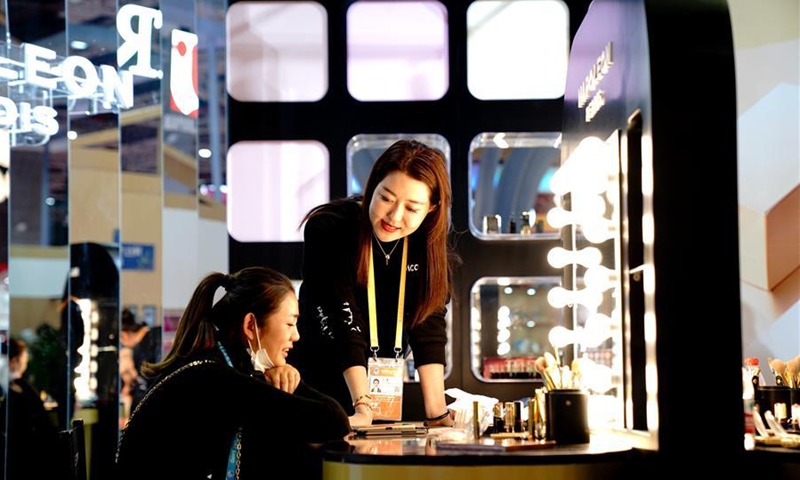US presence at exhibit biggest ever
By GT staff reporters Source: Global Times Published: 2020/11/8 19:28:40
Contrast to some politicians’ push for decoupling

An exhibitor provides beauty consultation to a consumer at the Consumer Goods exhibition area during the third China International Import Expo (CIIE) in Shanghai, east China, Nov. 7, 2020. (Xinhua/Zhang Jiansong)
US companies have voted with their feet by sporting the largest space at the third China International Import Expo (CIIE) in Shanghai, one of the most important trade shows in the world, rebutting efforts and rhetoric aimed at decoupling the world's two largest economies.
In a press briefing for the CIIE on Sunday, Kong Fuan, deputy director-general of the CIIE Bureau, said that among exhibitors from various countries, the US has the largest exhibition area while Japan has the largest number of exhibitors.
A total of 197 US companies came to the third CIIE, five more than last year, despite the logistics hurdles caused by the COVID-19 pandemic. The companies put 1,373 items on display, the largest number among countries, according to a report by state broadcaster CCTV.
The large presence of US firms attending the CIIE lies in stark contrast to the policies of the Trump administration, with its protectionist tariffs and efforts to divide the two economies.
China's enormous market, stable society, effective virus control, and earlier resumption of production all contribute to its attractiveness to US companies, Chinese analysts said, adding that the attendance by US companies at the CIIE showed China-US trade and economic cooperation ties are unbreakable.
In its latest report in October, the IMF projected that China, with 1.9-percent GDP rise, will be the only major economy to achieve growth in 2020.
Tyson Foods, the world's largest chicken, beef and pork producer, brought its newly developed pig feet and ear, and chicken feet products to the show and signed an agreement with the Shanghai local government to set up a regional headquarters in the city.
"It's the first time that Tyson Foods participated in the CIIE. We have reached preliminary agreements with Sam's Club, Carrefour and Yonghui Superstores with a total value of over $450 million, which surprised us," Xue Jun, the general sales manager of Tyson China, told the Global Times on Sunday.
US food giant Mars, owner of the M&M's chocolate brand, put the focus on the application of digitalization and internet technology in the retail industry.
Clarence Mak, president of Mars Wrigley China, told the Global Times that its Chinese business division will be treated as the growth engine of Mars in the company's globalized strategy in the post-virus world. The company said it is building Asia's largest pet food factory in North China's Tianjin city.
US companies also said their business decisions won't be affected by the US election result.
Robert Aspell, president of Asia Pacific of Cargill Investments (China) Ltd, said the US election result won't affect Cargill's plan for the Chinese market. The US food ingredient supplier said it expected to sign $2.7 billion worth of contracts for soybeans, beef, grain and iron ore at the CIIE.
"We're very confident in the Chinese market. I think we've seen that the pandemic is under control, is really well managed. We see the economy has responded strongly with third-quarter GDP revival, so we're excited," Aspell told GT in a previous interview.
Many US companies have also followed China's development trend closely and brought their products and services accordingly.
US machinery manufacturer Caterpillar showcased its power system, engines and refurbished models featuring high energy efficiency and low carbon emissions for customers in energy, mining and construction industries.
Li Yong, deputy chairman of the Expert Committee of the China Association of International Trade, said the "biggest" attendance by US firms at the CIIE drove one point home — that the so-called decoupling is a distortion of reality hyped by some US politicians and such hype is not heeded by US companies looking for global growth.
"Companies, in their globalized development strategy, heed the call of the market," Li, who is in Shanghai to observe the expo, told the Global Times on Sunday.
In a statement dated November 3, Gregory Gilligan, chairman of the American Chamber of Commerce in China, wrote that "the benefits that US-China trade and cooperation bring to the US are many and varied. Its economy, development of innovation, practices, overall competitiveness, corporate revenues and employment all benefit from American corporate involvement in China."
Despite trade war tariffs and the disruptions of the pandemic, China's trade with the US continued to grow, rising 3.9 percent year-on-year to 3.2 trillion yuan ($480 billion) in the first 10 months.
Li noted that China's enhanced efforts to protect intellectual property rights have prompted more and more foreign companies to establish production bases serving the Chinese domestic market as well as neighboring regions.
"No matter how the politics change, growing our business is our first concern," said Zhang Yufeng, president of US conglomerate Honeywell China, told the Global Times on Sunday.
"Since 2010, we have been sticking to the strategy of localized research and development, design and production for the local market, and this strategy has worked well," Zhang noted.
Newspaper headline: US firms crowd exposition